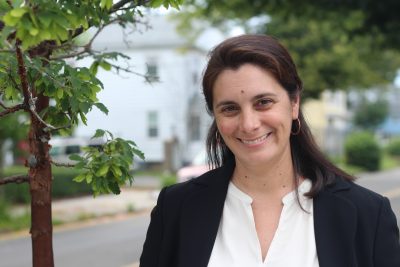- Name, SSW Class & Concentration
Sarah Miller, MSW Class of 2022, Concentration in Policy Practice
- Which came first – your interest in politics or interest in social work? In other words, did a desire to be involved in politics inspire you to pursue a degree in social work or did your pursuit of a social work degree inspire you to get involved in politics?
Social work practice and politics are inextricably linked for me. I have always been involved in efforts to improve my community and learned to work on political campaigns and lobby elected officials as integral components of this process. If we are honest about root causes and determined to find systemic solutions rather than solely treat symptoms, politics is necessary. So while I was politically involved long before deciding to pursue a social work degree, I found my way into politics as a tool for advancing social work goals.
- What made you decide to run for office?
My district in New Haven has high needs and struggled with representation for over a decade. Four prior alders either resigned mid-term or were largely absent. As an engaged community member, I saw the impact of this absence accrue in the form of missed funding, misdrawn maps, and diminished power. For years, I was encouraged to run but resisted taking on the time commitment and diverting focus from my specific interests to broader citywide concerns. Yet at the moment, we have a few major, time-sensitive projects that need political support to make it over the finish line, including a critical redevelopment project on our main street, the distribution of ARPA dollars, and redistricting. I decided to run now so as not to risk letting these opportunities slip by, as has occurred in the past.
- What are your future career aspirations?
I edited academic books at Yale University Press for fifteen years before making a career shift in the summer of 2020. During those years, my volunteer community work slowly took on a large role in my life. Perhaps because of the organic way in which I came into social work, I have clear aspirations for my practice but not career goals per se. All of my community work is directed toward cultivating a holistic system of support for young people in our city. In addition to serving on the New Haven Board of Alders, I work as the Manager of Strategy and Planning for Clifford Beers, which is the oldest outpatient mental health clinic in the United States and provides wraparound services for children and families. This professional role lives on the same continuum as my political work and pursuit of a social work degree; and I’ll continue to pursue political and professional opportunities to position my efforts for maximum impact.
- Do you feel serving in public office will help you in the social work profession or vice versa (or both)?
Public office is a social work profession, utilizing both micro and macro skills. There is an enormous amount of 1:1 work with constituents, advocates, and officials. Ideally, public office is about translating those conversations into policy that resolves problems, rights inequities, and expands opportunities.
- What is the accomplishment you are most proud of in your time at UConn School of Social Work?
During my first year field placement with Connecticut Voices for Children, I authored the 2021 State of Early Childhood, a survey report that the organization published periodically for nearly twenty years, and which I previously studied and admired. It took on special importance amidst the historic disruption to Connecticut’s system of early care and education due to COVID-19, and was especially relevant to me as I navigated these challenges with my own two children while writing.